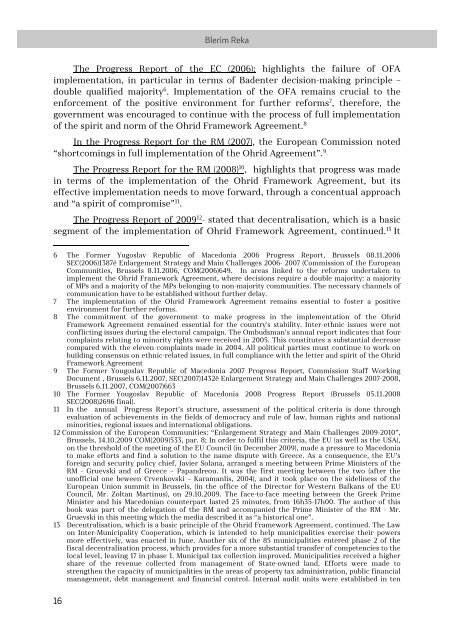Download - South East European University
Download - South East European University
Download - South East European University
Create successful ePaper yourself
Turn your PDF publications into a flip-book with our unique Google optimized e-Paper software.
Blerim Reka<br />
The Progress Report of the EC (2006): highlights the failure of OFA<br />
implementation, in particular in terms of Badenter decision-making principle –<br />
double qualified majority 6 . Implementation of the OFA remains crucial to the<br />
enforcement of the positive environment for further reforms 7 , therefore, the<br />
government was encouraged to continue with the process of full implementation<br />
of the spirit and norm of the Ohrid Framework Agreement. 8<br />
In the Progress Report for the RM (2007), the <strong>European</strong> Commission noted<br />
“shortcomings in full implementation of the Ohrid Agreement”. 9<br />
The Progress Report for the RM (2008) 10 , highlights that progress was made<br />
in terms of the implementation of the Ohrid Framework Agreement, but its<br />
effective implementation needs to move forward, through a concentual approach<br />
and “a spirit of compromise” 11 .<br />
The Progress Report of 2009 12 - stated that decentralisation, which is a basic<br />
segment of the implementation of Ohrid Framework Agreement, continued. 13 It<br />
6 The Former Yugoslav Republic of Macedonia 2006 Progress Report, Brussels 08.11.2006<br />
SEC(2006)1387ë Enlargement Strategy and Main Challenges 2006- 2007 (Commission of the <strong>European</strong><br />
Communities, Brussels 8.11.2006, COM(2006)649. In areas linked to the reforms undertaken to<br />
implement the Ohrid Framework Agreement, where decisions require a double majority: a majority<br />
of MPs and a majority of the MPs belonging to non-majority communities. The necessary channels of<br />
communication have to be established without further delay.<br />
7 The implementation of the Ohrid Framework Agreement remains essential to foster a positive<br />
environment for further reforms.<br />
8 The commitment of the government to make progress in the implementation of the Ohrid<br />
Framework Agreement remained essential for the country's stability. Inter-ethnic issues were not<br />
conflicting issues during the electoral campaign. The Ombudsman’s annual report indicates that four<br />
complaints relating to minority rights were received in 2005. This constitutes a substantial decrease<br />
compared with the eleven complaints made in 2004. All political parties must continue to work on<br />
building consensus on ethnic-related issues, in full compliance with the letter and spirit of the Ohrid<br />
Framework Agreement<br />
9 The Former Yougoslav Republic of Macedonia 2007 Progress Report, Commission Staff Working<br />
Document , Brussels 6.11.2007, SEC(2007)1432ë Enlargement Strategy and Main Challenges 2007-2008,<br />
Brussels 6.11.2007, COM(2007)663<br />
10 The Former Yougoslav Republic of Macedonia 2008 Progress Report (Brussels 05.11.2008<br />
SEC(2008)2696 final).<br />
11 In the annual Progress Report’s structure, assessment of the political criteria is done through<br />
evaluation of achievements in the fields of democracy and rule of law, human rights and national<br />
minorities, regional issues and international obligations.<br />
12 Commission of the <strong>European</strong> Communities: “Enlargement Strategy and Main Challenges 2009-2010”,<br />
Brussels, 14.10.2009 COM(2009)533, par. 8; In order to fulfil this criteria, the EU (as well as the USA),<br />
on the threshold of the meeting of the EU Council (in December 2009), made a pressure to Macedonia<br />
to make efforts and find a solution to the name dispute with Greece. As a consequence, the EU’s<br />
foreign and security policy chief, Javier Solana, arranged a meeting between Prime Ministers of the<br />
RM - Gruevski and of Greece – Papandreou. It was the first meeting between the two (after the<br />
unofficial one beween Crvenkovski – Karamanlis, 2004), and it took place on the sideliness of the<br />
<strong>European</strong> Union summit in Brussels, (in the office of the Director for Western Balkans of the EU<br />
Council, Mr. Zoltan Martinus), on 29.10.2009. The face-to-face meeting between the Greek Prime<br />
Minister and his Macedonian counterpart lasted 25 minutes, from 16h35-17h00. The author of this<br />
book was part of the delegation of the RM and accompanied the Prime Minister of the RM - Mr.<br />
Gruevski in this meeting which the media described it as “a historical one”.<br />
13 Decentralisation, which is a basic principle of the Ohrid Framework Agreement, continued. The Law<br />
on Inter-Municipality Cooperation, which is intended to help municipalities exercise their powers<br />
more effectively, was enacted in June. Another six of the 85 municipalities entered phase 2 of the<br />
fiscal decentralisation process, which provides for a more substantial transfer of competencies to the<br />
local level, leaving 17 in phase 1. Municipal tax collection improved. Municipalities received a higher<br />
share of the revenue collected from management of State-owned land. Efforts were made to<br />
strengthen the capacity of municipalities in the areas of property tax administration, public financial<br />
management, debt management and financial control. Internal audit units were established in ten<br />
16

















